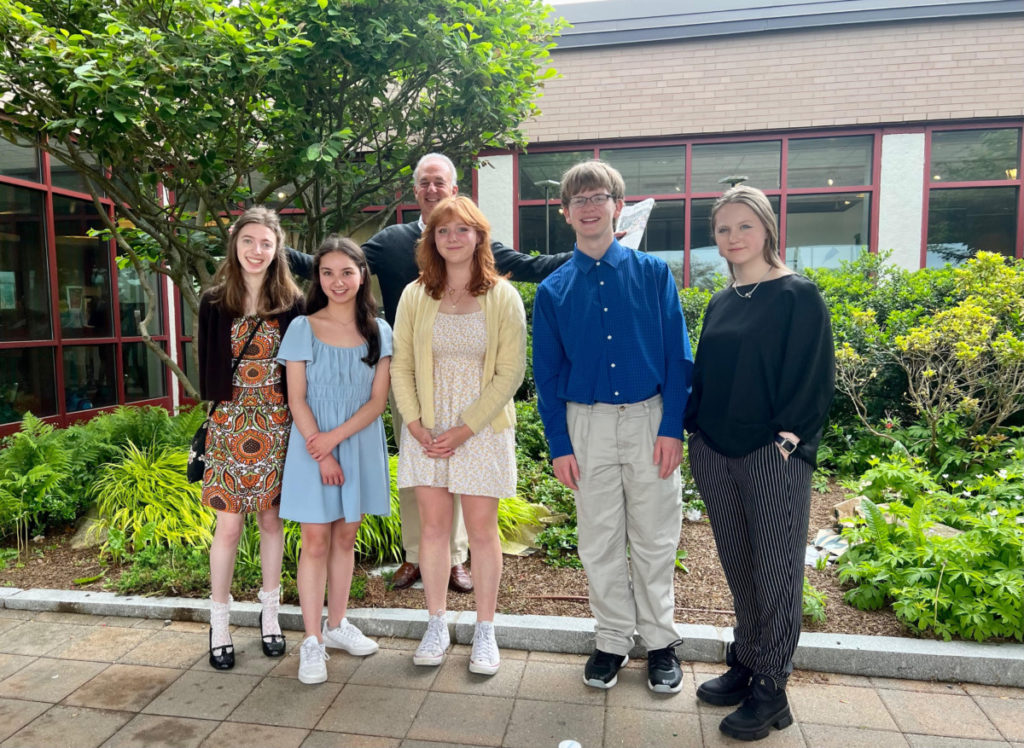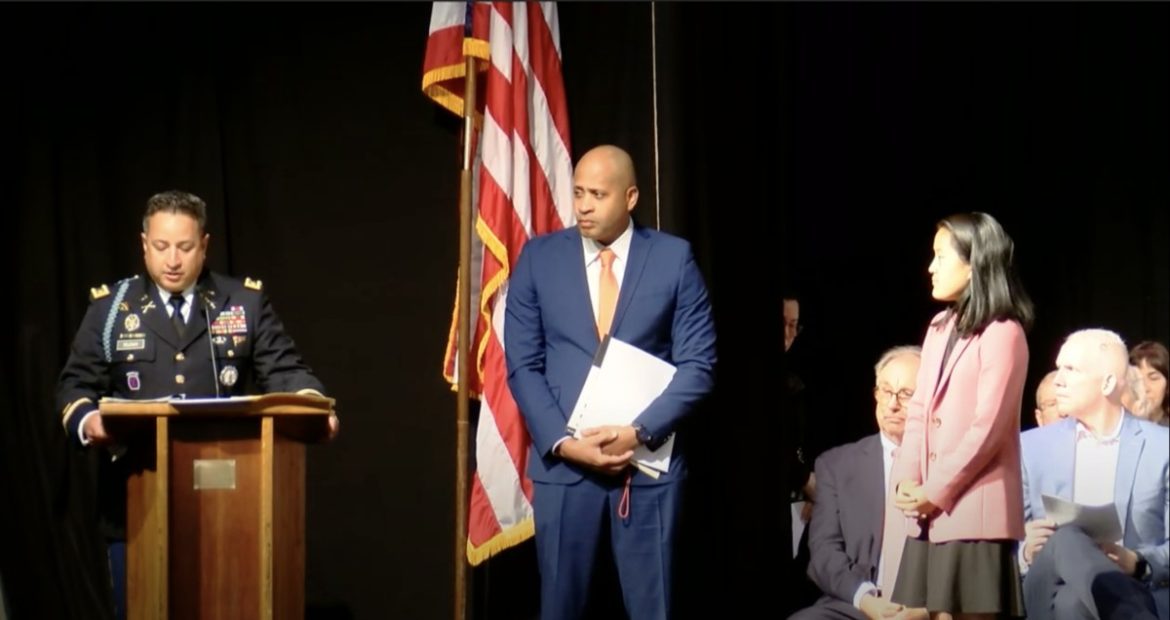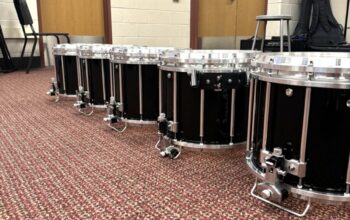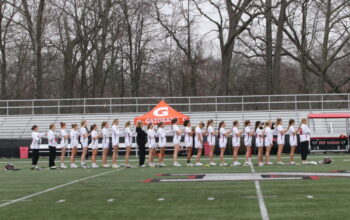Ava Fonss, Editor-in-Chief
@afonsscourant
On Friday May 27, the accomplishments of more than 120 students were celebrated at the annual Recognition Assembly held in the auditorium. The ceremony presented a wide range of awards and acknowledged the positive contributions that students have made to the school and community over the years. A reception was held in the main lobby immediately following the event.
The assembly is held each year in order to recognize notable members of the student body. “We’re always looking for ways to bring attention to the great work that students do,” Assistant Principal Ari Rothman said. “Great work is not just academic accomplishment–we look at service, leadership, character, and contribution to the community.”
According to Mr. Rothman, the process begins with faculty members, who nominate students in accordance with the criteria for each award. “Every award has a specific set of descriptors, and that’s the process by which people are chosen,” he said. “The descriptors are sent around, and the staff then nominates students who they believe match the criteria.”
When selecting students to nominate, several factors are considered. “When we look at departmental awards, the staff finds people who have accomplished a great deal in those programs, not just necessarily the students who received the highest grades,” Mr. Rothman said. “I encourage the faculty to look for kids who have really brought the most to the program.”
By considering nominations from the entire faculty, the ceremony honors students with many different strengths. “We make sure that we’re reaching out and finding kids who might be below the radar,” Mr. Rothman said. “There are kids who I don’t know personally, and I don’t know about all of the good things they do. That’s why the entire staff weighs in and nominates students.”
Once students are nominated, final decisions are made by allowing the faculty to discuss potential candidates. “If a student’s name is common and several people have nominated a certain student for an award, then obviously that’s how that person is chosen,” Mr. Rothman said. “Departments do the same thing in terms of their particular program awards.”

The New Canaan Conservation Commission awarded $500 to members of the science team for their work sampling waterways and highlighting the need for upstream minimization in the application of fertilizers.
According to English Department Chair Evan Remley, the selection process is a collaborative effort between faculty members within the English department. “Teachers will come up with a list of names and then other teachers can weigh in and offer their thoughts about the kind of work that a particular student did and whether or not they’re a good candidate,” he said. “From there we usually get together and discuss the different candidates.”
The faculty also considers factors beyond students’ work in the classroom. “One of the criteria we try to consider is how committed that student is to English as a discipline,” Mr. Remley said. “We look at whether the students participate in things like Poetry Fest or write for Spectator. These are the subjective pieces, and we have a really tough time deciding.”
The Career and Technical Education (CTE) Department also considers several factors beyond academic excellence for its respective awards. “We consider work ethic, ability to work with others, capacity to take criticism and bounce back, and willingness to fail and learn from mistakes,” CTE Department Chair James Zambarano said. “Attitude and respect by peers and faculty are also important factors.”
According to Mr. Zambarano, the type of awards presented depend on the abilities of current students. “If a faculty member has a student who they wish to recognize in a certain area, we sometimes create an award,” he said. “The same is true the other way: If we do not have a student that meets the criteria for an award, we don’t offer it that year.”
Several awards presented to students were sponsored by outside organizations and included a monetary prize. “People have set up several funds and awards in someone’s honor or name,” Mr. Rothman said. “These awards have very specific criteria and descriptors.”
Two new awards were presented this year from local organizations. “The New Canaan Conservation Commission decided to award grants to two groups within the school for the work they’ve done in the community in terms of conservation and the environment,” Mr Rothman said. “We also have a group in town called Stand Together Against Racism (STAR) that decided to recognize a student.”
A new award was also presented this year in honor of Jeanne McDonagh, an art teacher of 32 years, who retired last year. “The art department wanted to find a way to honor her and her work from over the years, and she was actually there to present the award,” Mr. Rothman said.
The Jeanne McDonagh Spirit Award was given to a student who is deeply passionate about art. “It was a beautiful honor and lovely surprise to receive this award,” senior Larson Riccoboni, who was selected to receive the recognition, said. “I’ve always been so thankful to the art department for mentoring me and helping me to find what I’m passionate about. This award and the sentiments behind it are something I will really cherish, and I’m glad that my passion for art was able to shine through and grow as a result of the positive influences of my teachers and peers.”
Larson views the award as an effective way to honor Ms. McDonagh’s legacy. “She was always encouraging and gracious, gave valuable advice to her students, and really left a permanent mark with those she interacted with,” she said. “This new award is a perfect way to demonstrate the work she has put into the art department, and honors both her artistic talents and kind nature as a teacher.”
Junior book awards, sponsored by either universities or the alumni associations of universities, were given to fourteen members of the junior class. “These colleges often want to recognize students, and some of these awards have very specific criteria,” Mr. Rothman said. “The same process of who gets recognized applies: we consider character, leadership, and academic excellence.”
Although students often view these awards as a way to enhance their resumes and applications, Mr. Rothman has a different perspective on the value of the assembly. “It’s a public acknowledgement of good work,” he said. “We’re recognizing that it matters when people are leaders, contribute to the community, do service, and accomplish great things in academic and extracurricular programs. It’s a way of celebrating what people bring and do for the school and the school community.”
Mr. Remley had a similar outlook. “I think it’s always a good thing to have achievement and intellectual curiosity recognized,” he said. “We value that these people are contributors to the classroom community and elevate the level of dialogue in class. As a school, we want to recognize these individuals because they serve as a model for all to follow.”




